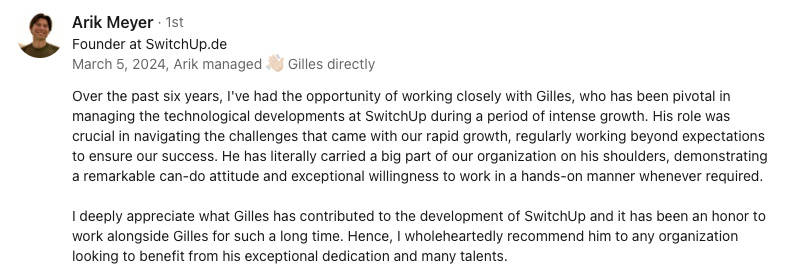Based In Western Europe
Abstract:
Western Europe has become a prominent force in global technology, with significant investment and growth in tech sectors. The region's stringent regulations, like GDPR, set global standards for data protection. The cultural influence is reflected in technology design, blending aesthetic sensibilities with a focus on privacy and ethical standards. Renowned universities attract global talent, fostering a skilled workforce. Cross-border collaborations create expansive tech networks, while sustainable practices drive eco-friendly innovations. Cities like Berlin, Paris, and Stockholm are thriving tech startup hubs. Western Europe hosts influential tech conferences and events, shaping the global tech narrative through multinational corporations headquartered in the region.
Western Europe's prominence in global technology
Western Europe has emerged as a formidable player in the global technology sphere, blending historical richness with cutting-edge innovation. This region, long known for its cultural and intellectual heritage, has recently seen substantial growth and investment in various tech sectors. From bustling startup hubs to thriving multinational corporations, Western Europe is carving out a significant niche in the global tech industry.
Let's not forget the strategic investments pouring into the tech landscape here. Governments and private sectors alike are channeling resources to fuel research, development, and entrepreneurship. Whether it's smart cities in Amsterdam, fintech revolutions in London, or the green tech boom in the Nordics, Western Europe is setting new benchmarks.
In addition, the region boasts impressive digital infrastructure that supports this rapid growth. High-speed internet, ubiquitous mobile networks, and advanced data centers create a fertile ground where technology can thrive. Such robustness is essential for nurturing everything from artificial intelligence to cloud computing.
One pivotal factor driving this technological upsurge is Western Europe’s stringent regulatory environment, particularly around data protection and privacy. Far from stifling growth, these regulations have actually galvanized innovation, compelling companies to develop more ethical and secure products. And let's be honest—balancing innovation with ethics is no small feat!
Moreover, the rich tapestry of cultures across Western Europe plays a unique role. It fosters a diverse range of ideas, making the tech solutions here more inclusive and globally relevant. A blend of different perspectives and experiences is often the secret sauce behind groundbreaking innovations.
All these elements combined make Western Europe an exciting place for technology professionals and enthusiasts. The region is not only a hub for creativity and innovation but also acts as a catalyst for global tech advancements. As we journey through this article, we'll explore the many facets that make Western Europe a cornerstone in the technology sector.
impact of stringent regulations like GDPR on global data protection standards
One of the most significant game-changers in the world of data protection has to be the General Data Protection Regulation (GDPR), rolled out by the European Union in 2018. This regulation wasn't just a local European affair; it rippled across the globe, shaking up how companies handle, store, and think about personal data.
GDPR has set a gold standard for data protection, creating a framework that champions individual privacy rights. Imagine telling your IT department that they'll face up to €20 million fines or 4% of global annual turnover for non-compliance—no wonder everyone took notice! These stringent measures have pushed companies worldwide to prioritize data security and rethink their data handling practices. It's like having a personal trainer who won't let you slack on those much-needed security workouts.
implications for global tech companies
For tech companies, particularly multinationals, GDPR compliance isn't optional—it’s a mandate. Companies that operate in the EU or handle data from EU citizens must adhere to these regulations, regardless of where they are geographically located. This has led to a sweeping overhaul of data policies, with many firms adopting GDPR as the de facto standard for their global operations.
So, why this intense focus on compliance? For one, it mitigates legal risks, but it also builds consumer trust. Who wouldn't prefer doing business with a company that takes data protection seriously? It's a badge of honor, almost like being ISO-certified but for privacy. In today’s data-driven world, trust is currency, and GDPR compliance is the vault that holds it.
Moreover, GDPR has catalyzed the development of new technologies and services focused on data protection. From pseudonymization and encryption to innovative consent management tools, companies are investing heavily in technology designed to keep data safe and secure. There’s even been a flourishing of roles such as Data Protection Officers (DPOs), tasked specifically with ensuring compliance.
setting trends for other regions
The ripple effect of GDPR extends far beyond the boundaries of the EU. Countries worldwide are crafting their own data protection laws, often modeled after the principles of GDPR. For instance, Brazil’s Lei Geral de Proteção de Dados (LGPD) and California’s Consumer Privacy Act (CCPA) have drawn inspiration from GDPR, aiming to grant more control to individuals over their personal data.
These regulations come with their own flavor but carry the same spirit of stringent data control and consumer empowerment. This trend signifies a shift towards more transparent data handling practices globally. And it’s not just governments catching on; even private firms and startups are building their systems to be GDPR-compliant from the get-go, considering it a competitive edge.
importance in the digital age
The importance of stringent data protection standards can't be stressed enough in today’s digital landscape. With cyber threats and data breaches becoming more sophisticated, a robust framework like GDPR serves as both a deterrent and a guideline. Companies have become more accountable, and users more aware—a win-win if you ask me.
Furthermore, by setting high standards, GDPR has pushed the envelope on ethical considerations in tech design. Companies are no longer just asking, Can we do this? but also Should we do this?. This ethical pivot is essential for fostering sustainable growth in the tech industry. After all, technology should serve humanity, not the other way around.
In conclusion, while GDPR may seem like a regulatory headache to some, its impact on global data protection standards is undeniably profound. It has not only raised the bar for data privacy but also transformed the way we think about data integrity and consumer trust. As tech professionals, we can take a moment to appreciate the rigor and foresight that GDPR brings to the table—providing a safer, more transparent digital ecosystem for all of us.
cultural influence in technology design and ethical considerations
The cultural mosaic of Western Europe is more than just an asset; it’s a guiding force in technology design. This diversity shapes a unique blend of aesthetic sensibilities and an unwavering emphasis on privacy and ethical standards. You can see these values intricately woven into the products and services emerging from this region.
Consider the case of companies like SAP and Spotify. These companies not only focus on functionality but also stress the importance of user privacy and ethical design. SAP's business software solutions are lauded for their data security features, ensuring that user data is handled with the utmost care. On the consumer side, Spotify's algorithms are designed to respect user privacy, making data protection a non-negotiable aspect of their service.
It’s not just about what these technologies can do but also about how they do it. By paying attention to aesthetics and user-centric design, Western European tech companies create products that are not only efficient but also enjoyable to use. Ever noticed the sleek simplicity of Scandinavian design in apps or gadgets? It's no coincidence. This approach fosters user trust and loyalty, which is invaluable in an age where data breaches and privacy concerns are rampant.
valuable lessons from the European tech ethos
Drawing inspiration from these examples, it's clear that Western Europe's cultural values heavily influence their approach to technology:
- Privacy by design: From the get-go, products are crafted with stringent privacy measures in place, not as an afterthought but as an integral part of the design process.
- Ethical considerations: Companies ask themselves tough questions, like whether their features or algorithms might harm users. It's not just about what’s technically possible, but what's ethically justifiable.
- Diverse perspectives: With a melting pot of cultures, the resulting technology solutions tend to be more inclusive and globally relevant, incorporating multiple viewpoints and needs.
impact on market appeal and user trust
The emphasis on privacy and ethics gives Western European tech firms a competitive edge. People are increasingly cautious about how their data is used, and they gravitate towards companies that respect their privacy. When users know they can trust a company, they’re more likely to engage with its products, providing a significant boost to market appeal.
This customer trust isn't just beneficial—it's essential. In technology, trust is the glue that holds user relationships together. Trust leads to loyalty, and loyalty leads to long-term success. Western European tech companies have grasped this principle and used it to their advantage, setting a standard that other regions are beginning to emulate.
the broader impact
The broader impact of these culturally influenced designs is a tech ecosystem where ethical considerations are prioritized. This has a ripple effect, encouraging other companies and even whole countries to rethink their approach to privacy and ethics. The result? A more secure and user-friendly tech environment globally.
In summary, the cultural landscape of Western Europe significantly influences its technology design and ethical considerations, setting high standards that resonate far beyond its borders. By focusing on privacy, ethics, and user-centric design, Western European tech companies not only win user trust but also create a more responsible and enjoyable digital world for everyone.
renowned universities and their role in attracting global talent and fostering a skilled workforce
Western Europe’s tech scene isn't just built on innovation and cool startups; it owes a lot to its renowned universities. These institutions are practically talent magnets, drawing bright minds from all over the globe and turning them into a highly skilled workforce. Let's take a closer look at how these academic powerhouses contribute to the tech ecosystem.
innovative research and development
First off, the level of innovative research coming out of universities like ETH Zurich, Imperial College London, and TU Delft is staggering. These institutions are not just keeping up with the tech trends; they're setting them. Take ETH Zurich, for example. This Swiss university is renowned for its groundbreaking work in robotics and artificial intelligence. Their research gives us a glimpse into the future, and let’s be honest, who wouldn’t want to be part of that? It's like being in a sci-fi movie but without the bad plot twists.
industry partnerships
But it’s not just about the ivory tower research. These universities are deeply integrated with the industry. They have established robust partnerships with leading tech companies, creating a symbiotic relationship that benefits both sides. At places like Imperial College London, students work on real-world projects alongside industry professionals. Companies get access to fresh ideas and cutting-edge research, while students get hands-on experience that makes their resumes pop. It’s a win-win situation—sort of like getting a free upgrade to first class on your tech career journey.
global talent attraction
The global appeal of these universities is unparalleled. Each year, thousands of international students flock to Western Europe’s academic institutions, enriching the student body with a diversity of thoughts, ideas, and backgrounds. Universities offer an array of tech-focused programs, from machine learning and cybersecurity to renewable energy engineering. These programs are designed to be globally relevant, ensuring that graduates are ready to take on challenges anywhere in the world. It’s like being handed a Swiss Army knife for your tech career—versatile and incredibly useful.
- Comprehensive curriculum: Most of these universities offer a curriculum that's both deep and broad, providing specialized knowledge while covering the essential aspects of technology and engineering.
- Advanced facilities: State-of-the-art labs and research centers mean students get to play with the coolest gadgets and software, preparing them for real-world applications.
- Networking opportunities: Regular seminars, workshops, and conferences bring students in direct contact with industry leaders and professionals, often leading to invaluable mentorship and job prospects.
creating a skilled workforce
The combination of cutting-edge research, industry collaboration, and global appeal leads to one obvious outcome—a highly skilled workforce. Graduates from these universities are not just book-smart; they’re job-ready. They come equipped with practical skills, innovative mindsets, and the kind of hands-on experience that employers crave. Think of them as the Swiss watches of the tech world—crafted with precision and built to last.
In conclusion, the renowned universities of Western Europe play a pivotal role in shaping the region’s tech landscape. They attract top-tier talent, foster innovative research, and cultivate a skilled workforce ready to tackle the challenges of the modern tech world. And if you ask me, that's something to raise our proverbial tech glasses to!
cross-border collaborations and the creation of expansive tech networks
One of the marvels of Western Europe's tech landscape is the seamless cross-border collaborations that fuel innovation and growth. Picture this: talent and ideas flow freely from Berlin to Paris, Amsterdam to Stockholm, forming a tech tapestry that's as colorful as it is inventive. Yes, folks, borders may exist on maps, but in the tech world, they are delightfully blurred.
the magic of collaborative ecosystems
So, what's the secret sauce behind these successful collaborations? For starters, initiatives like the European Union’s Horizon 2020 program have laid the groundwork. This program promotes joint R&D across member states, pooling resources and expertise from Europe's finest to tackle large-scale tech challenges. It's like assembling an Avengers team but with laptops and algorithms instead of superpowers.
Moreover, we have platforms like the European Institute of Innovation & Technology (EIT) that act as catalysts. EIT drives knowledge and innovation communities, bringing together universities, research labs, and businesses to collaborate on groundbreaking projects. These efforts ensure that ideas skip the pipeline and jump straight into development, giving life to technologies that might have otherwise remained as just “great concepts.”
examples of successful partnerships
Let’s talk about some real-world examples that illustrate the power of cross-border collaborations:
- Airbus and Rolls-Royce: These two giants have collaborated across borders for decades, blending German efficiency with British engineering excellence to create some of the world’s most advanced aerospace technologies. Their joint efforts ensure safer and more efficient air travel around the globe.
- Spotify and Soundtrack Your Brand: This Sweden-based collaboration harnesses Spotify's streaming platform with innovative business music solutions, offering something much cooler than background elevator music for retail and hospitality spaces worldwide.
- Eurotech Universities Alliance: Consisting of leading technical universities across Western Europe, this alliance fosters student exchanges, joint research programs, and shared facilities, creating an expansive network of knowledge and innovation.
enhancing competitiveness on the global stage
The impact of these cross-border alliances is far-reaching. For one, they elevate Western Europe’s status on the global stage, making the region a hotbed for tech innovation. Collaborative networks lead to faster time-to-market for new technologies, quicker problem-solving through shared knowledge, and a richer diversity of ideas as companies and institutions bring different perspectives to the table.
Additionally, these partnerships often result in sizable funding opportunities, as investors are more likely to back projects that have an international and collaborative dimension. And let's not forget the talent magnet effect—by showcasing a unified, innovative front, Western Europe continues to attract top-tier minds from around the world, ensuring a constant influx of fresh ideas and cutting-edge skills.
In essence, cross-border collaborations are the lifeblood of Western Europe's tech scene. By working together, we're not just creating cool gadgets and groundbreaking software; we're building a vibrant, competitive, and inclusive tech ecosystem that benefits us all.
sustainable practices and eco-friendly innovations in tech
When it comes to sustainability, Western Europe is no slouch. The region's commitment to eco-friendly innovations within the tech sector is almost a badge of honor. And let's face it, in a world grappling with climate change, who wouldn't want that badge?
green technologies leading the way
Take, for instance, the astounding advancements in green technologies. Western European tech companies are leading the charge with innovative solutions that prioritize both the planet and progress. Consider the example of Siemens, which has been a pioneer in developing smart grids and renewable energy solutions. Their wind turbine technology is an absolute game-changer, harnessing the power of nature while reducing our carbon footprint. It’s like getting a two-for-one deal but for the future.
Then there’s the automotive sector—think electric vehicles (EVs). Companies like Tesla may grab headlines, but let’s not overlook European contributions such as those from Volkswagen and BMW. These automakers are making significant strides in EV technology, from affordable electric cars to high-performance models that would make any petrolhead reconsider their choices. It's like going green without compromising on the need for speed.
eco-friendly initiatives and their impact
Besides these technologies, there are eco-friendly initiatives springing up all over the continent. For example, Amsterdam's focus on creating a circular economy involves initiatives to reduce waste and promote recycling. Tech startups are continuously innovating to support these goals. Take BioBuddi, a Dutch company making biodegradable toys from bio-based materials. This isn’t just child’s play—it’s a smart, sustainable business model that reduces plastic waste.
Another initiative worth highlighting is the Nordic Green Tech Valley in Sweden. This initiative gathers local and global enterprises to test and develop sustainable technologies. Projects range from sustainable energy solutions to urban farming technologies, essentially turning green ideas into tangible actions.
- Smart cities: From the deployment of IoT sensors to manage energy consumption better to the integration of renewable energy sources, European cities are smartening up in more ways than one.
- Carbon-neutral data centers: Companies like Google and Microsoft are setting up carbon-neutral data centers across Western Europe, making sure that even our cloud storage has a green footprint.
- Energy-efficient hardware: Startups and established firms are focusing on making hardware that consumes less energy, ensuring that our tech toys are as green as they are powerful.
shaping industry practices
But what’s most inspiring is how these innovations are shaping industry practices. It's not just about adopting new technologies but also rethinking entire business models. Take the push for remote work, which, let’s be honest, has been fast-tracked by the pandemic. Numerous Western European companies were already ahead of the curve, seeing the environmental benefits of reduced commutes and smaller office spaces. This shift isn’t just good for employees; it's a big win for our carbon footprint too.
All these efforts show that sustainability and innovation aren’t mutually exclusive—they’re two sides of the same coin. Western Europe’s tech industry is proving that we can build a greener, more sustainable future without slowing down technological progress. And if you ask me, that's a win-win worth celebrating.
exploring tech startup hubs like Berlin, Paris, and Stockholm
When you think about tech startup hubs in Western Europe, Berlin, Paris, and Stockholm immediately come to mind. Each of these cities brings its own unique flavor to the tech scene, making them irresistible to entrepreneurs and investors alike. Let me highlight some of the factors that set these cities apart and the notable startups that have sprung from these fertile grounds.
berlin: the wild child of innovation
Berlin is like the eclectic artist of the tech world—filled with creativity, diversity, and a dash of rebellious spirit. The city’s affordability (yes, even in Europe!) combined with a rich cultural history makes it a magnet for young entrepreneurs eager to shake things up.
What sets Berlin apart?
- Vibrant startup ecosystem: Co-working spaces like Factory Berlin and betahaus foster a collaborative environment.
- Streamlined bureaucracy: Germany has made significant efforts to reduce the red tape for startups, making it easier to set up shop.
- Access to talent: A plethora of tech-savvy professionals and coders from nearby Technical University of Berlin and other institutions.
Among the success stories, we have N26, the digital bank revolutionizing how we manage money, and Delivery Hero, a global food delivery giant that started as a plucky Berlin startup. These success stories prove that Berlin isn’t just about cool street art and underground clubs; it's a serious contender in the tech world.
paris: the sophisticated innovator
Paris, often synonymous with sophistication and style, holds its own as a tech startup hub, focusing on a blend of elegance and innovation.
Why Paris?
- Access to capital: French venture capital is robust, thanks to initiatives like La French Tech.
- Cultural capital: The city's rich cultural and historical backdrop makes it a compelling place to live and work.
- Government support: Policies such as the French Tech Visa make it easier for overseas talent to relocate.
With startups like BlaBlaCar, a ride-sharing platform, and Doctolib, a digital health pioneer, Paris demonstrates that it’s not just about haute cuisine and romantic strolls along the Seine. These companies have gone on to make significant impacts in their respective fields, drawing even more attention to the Parisian tech scene.
stockholm: the sustainable centurion
Stockholm has become a hub for sustainable tech innovations, perfectly aligning with its picturesque Scandinavian ethos. The city offers a blend of high quality of life and a commitment to eco-friendly practices.
What makes Stockholm stand out?
- Sustainability focus: Strong emphasis on green tech and sustainable solutions.
- Tech talent: Excellent tech education and a robust talent pool, thanks to institutions like KTH Royal Institute of Technology.
- Government initiatives: Positive policies that facilitate startup growth and innovation.
Success stories from Stockholm include Spotify, the music streaming giant that needs no introduction, and Klarna, which is revolutionizing how we shop online. These companies show that in Stockholm, the focus is on creating a sustainable future, one successful startup at a time.
Berlin, Paris, and Stockholm are not just tech hubs; they are vibrant ecosystems where innovation meets cultural richness. Each city offers a unique mix of opportunities, making them prime targets for entrepreneurs looking to make their mark. So, whether you're into Berlin’s creative chaos, Paris’ sophisticated charm, or Stockholm’s sustainable innovations, there's a tech hub in Western Europe ready to welcome you.
influential tech conferences and events held in Western Europe
If there’s one thing that makes Western Europe a tech magnet, it's the array of influential tech conferences and events that shape the global tech landscape. These gatherings are more than just talk shops; they're where the tech world meets to network, showcase innovations, and engage in industry-shaping discussions. Let’s highlight a few of the big hitters.
mobile world congress (MWC) in Barcelona
First up, Mobile World Congress (MWC) in Barcelona is often dubbed the king of tech conferences. Bringing together tens of thousands of attendees from around the globe, it’s where the big announcements happen. From 5G rollouts to the latest in mobile tech, if it’s hot, you’ll hear about it here. And trust me, rubbing shoulders with industry giants while sampling tapas isn’t a bad gig.
web summit in Lisbon
Next, there’s the Web Summit in Lisbon. Known as the world’s largest technology conference, this event serves up an eclectic mix of tech topics, from AI to fintech. The energy is palpable, and the opportunities for networking are endless. Think of it as the Glastonbury of the tech world but with fewer muddy boots and more business cards.
slush in Helsinki
Then we have Slush in Helsinki, a conference that’s part industry powwow, part laser show. Focused on startups and investors, Slush excels at fostering meaningful connections. If you’re looking to find the next big thing or get inspired by innovative pitches, Slush is the place to be—just don’t forget your winter coat.
IFA in Berlin
Also noteworthy is IFA in Berlin, which is all about consumer electronics. From the latest smart home gadgets to cutting-edge wearables, IFA is a playground for tech enthusiasts and industry professionals alike. It’s where you see tomorrow’s tech trends today, and who can resist Berlin’s vibrant cultural scene as a backdrop?
bits & pretzels in Munich
And let’s not forget Bits & Pretzels in Munich, which combines startup innovation with Bavarian hospitality. Imagine networking with influential VCs and fellow techies over a freshly baked pretzel. Sounds like a dream? It’s very much a reality here.
These events aren’t just gatherings; they’re where ideas come to life and futures are shaped. Whether you’re hunting for inspiration, seeking investment, or simply want to see what’s next, Western Europe’s tech conferences are the place to be. So pack your bags (and perhaps a few business cards) and experience the magic for yourself.
the role of multinational corporations headquartered in Western Europe in shaping the global tech scene
When it comes to shaping the global tech industry, Western Europe's multinational corporations play a pivotal role. Companies like Siemens, SAP, and Nokia aren't just hometown heroes; they're global heavyweights driving technological advancements and setting industry standards. Let's break down how these powerhouses contribute to the global tech scene.
innovative leadership
First off, these corporations are innovation champions. Take Siemens, for example. Known for its prowess in industrial automation and smart infrastructure, Siemens continuously pushes the envelope. Their work in fields such as IoT and renewable energy has ripple effects far beyond European borders, setting benchmarks for others to follow. It’s like having a tech-savvy big brother who’s always at the cutting edge.
setting industry standards
Another critical contribution is in setting industry standards. SAP, a titan in enterprise software, has created solutions that major organizations around the world depend on. By developing robust and adaptable software platforms, they set a high standard for enterprise resource planning (ERP) systems globally. And trust me, once an industry standard is set, it’s like getting the best kind of peer pressure—everyone has to step up their game.
global reach with local impact
These companies also excel in maintaining a global reach while addressing local needs. Nokia’s advancements in telecommunications have connected remote areas and transformed digital communications. They bring sophisticated technology solutions to various markets, adapting to local requirements while maintaining a global vision. Essentially, it’s like being a world traveler who speaks the local dialect fluently.
- Employment generators: They create thousands of jobs worldwide, contributing significantly to local economies while fostering global talent.
- Research and development: With substantial investments in R&D, these companies are at the forefront of tech innovations, from AI to 5G.
- Corporate social responsibility: Many of these multinationals also lead in sustainability and ethical practices, setting examples for others to follow.
driving tech leadership
The influence of these corporations extends to their role in fostering a leadership culture within the tech industry. By nurturing talent through collaborations with top universities and participating in influential tech conferences, they continuously shape the future of technology. It’s like having a well-connected mentor who’s always looking out for the future leaders of tech.
So, when we talk about Western Europe's role in the global tech arena, let's give a nod to these multinational corporations. They aren’t just contributing— they’re leading the charge, setting the pace, and ensuring that innovation, sustainability, and ethical practices go hand in hand. It’s a tough balancing act, but someone’s got to do it—and they do it exceptionally well.
the tech industry's bright future in western Europe
Reflecting on Western Europe's role in the tech arena, it's clear: this region is a powerhouse of innovation and diversity.
From the robust support of renowned universities and stringent but visionary regulations like GDPR, to the creativity infused by its cultural mosaic, Western Europe leads in both ethical standards and groundbreaking innovation. The influence is undeniable—cross-border collaborations and eco-friendly practices are not just trends here but the norm, fostering a deeply interconnected tech ecosystem.
Moreover, the prominence of tech startup hubs in cities like Berlin, Paris, and Stockholm, combined with influential conferences like MWC in Barcelona and Web Summit in Lisbon, underscore the region’s edge in shaping global tech narratives. And let’s not forget the strong impact of multinational corporations based here, continually pushing boundaries and setting industry standards worldwide.
So let's raise our digital glasses to Western Europe—a place where tradition meets innovation, and regulations inspire, rather than stifle, creativity. As technology continues to advance, this region's balanced blend of ethics, cultural diversity, and relentless innovation ensures it remains a central figure on the global tech stage.
You might be interested by these articles:
- Redefining Care: Datafication's Impact in Healthcare
- Enhancing Data Privacy with Federated Learning
- The AI Woke Police vs. The Irony Brigade: Can Robots Understand Sarcasm?
- Laughing with AI: Navigating the Ethical Maze of Artificial Humor in Branding
- The Symphony of Creativity in an AI-Powered World





